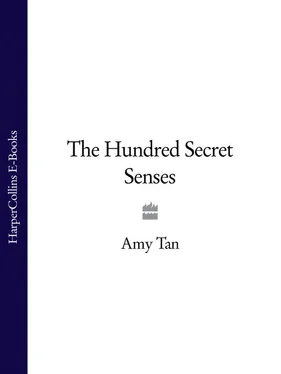But Simon didn’t seem to know that I was flirting with him. ‘You know what I like about you?’ he asked me. ‘You treat me like a good buddy. We can talk about anything and we don’t let the other thing get in the way.’
‘The other what?’
‘The fact that we are … Well, you know, the opposite-sex thing.’
‘Really?’ I said, faking astonishment. ‘You mean, I’m a girl but you’re a – I had no idea!’ And then we both broke into hearty guffaws.
At night I’d cry angrily, telling myself that I was a fool. I vowed many times to give up any hope of romance with Simon – as if it were possible to will myself not to be in love! But at least I knew how to put on a good front. I continued to play the jovial good buddy, listening with a smile on my face and a cramp in my heart. I expected the worst. And sure enough, sooner or later, he would bring up Elza, as though he knew she was on my mind as well.
Through three months of masochistic listening I came to know the minutiae of her life: That she lived in Salt Lake City, where she and Simon had grown up, tussling with each other since the fifth grade. That she had a two-inch scar on the back of her left knee the shape and color of an earthworm, a mysterious legacy from infancy. That she was athletic; she kayaked, backpacked, and was an expert cross-country skier. That she was musically gifted, a budding composer, who had studied with Artur Balsam at a famous summer music camp in Blue Hill, Maine. She’d even written her own thematic variation on the Goldberg Variations. ‘Really?’ I said to each praiseworthy thing he said about her. ‘That’s amazing.’
The strange thing is, he kept speaking about her in the present tense. Naturally I thought she was alive in the present time. Once, Simon pointed out I had smeared lipstick on my teeth, and as I hurriedly rubbed it off, he added, ‘Elza doesn’t wear makeup, not even lipstick. She doesn’t believe in it.’ I wanted to scream, What’s there to believe!? You either wear makeup or you don’t! By then I wanted to smack her, a girl so morally upright she had to be the most odious hominid ever to walk planet Earth, in her non-animal hide shoes. Even if Elza had been sweet and insipid, it wouldn’t have mattered, I still would have despised her. To me, Elza didn’t deserve Simon. Why should she have him as one of her perks of life? She deserved an Olympic gold medal for Amazon discus-throwing. She deserved a Nobel Peace Prize for saving retarded baby whales. She deserved to play organ for the Mormon Tabernacle Choir.
Simon, on the other hand, deserved me, someone who could help him discover the recesses of his soul, the secret passageways that Elza had barricaded with constant criticism and disapproval. If I complimented Simon – told him what he had said was profound, for example – he’d say, ‘You think so? Elza says one of my biggest faults is going along with whatever’s nice and easy, that I don’t think things through hard enough.’
‘You can’t believe everything that Elza says.’
‘Yeah, that’s what she says too. She hates it when I just go along with what’s been handed to me as truth. She believes in trusting your own intuitions, sort of like that guy who wrote Walden , what’s his name, Thoreau. Anyway, she thinks it’s important for us to argue, to get to the marrow of what we believe and why.’
‘I hate to argue.’
‘I don’t mean argue in the sense of a fight. More of a debate, like what you and I do.’
I hated being compared and falling short. I tried to sound playful. ‘Oh? So what do you two debate?’
‘Like whether celebrities have a responsibility as symbols and not just as people. Remember when Muhammad Ali refused to be drafted?’
‘Sure,’ I lied.
‘Elza and I both thought he was great, taking a personal stand like that against the war. But then he wins back the heavyweight title and later President Ford invites him to the White House. Elza said, “Can you believe it?” I said, “Hell, if I were invited, I’d go to the White House too.” And she said, “By a Republican president? During an election year?” She wrote him a letter.’
‘The president?’
‘No, Muhammad Ali.’
‘Oh, right. Of course.’
‘Elza says you can’t just talk politics or watch it happen on television. You have to do something, otherwise you’re part of it.’
‘Part of what?’
‘You know, hypocrisy. It’s the same as corruption.’
I imagined Elza looking like Patty Hearst, wearing a beret and combat fatigues, an automatic rifle perched on her hip.
‘She believes all people should take an active moral position on life. Otherwise the world’s going to end in thirty years or less. A lot of our friends say she’s a pessimist. But she thinks she’s the real optimist, because she wants to do something to change the world in a positive way. If you think about it, she’s right.’
While Simon grew more expansive about Elza’s ridiculous opinions, I’d be dreamily analyzing his features, how chameleon-like they were. His face would change – from Hawaiian to Aztecan, Persian to Sioux, Bengali to Balinese.
‘What kind of name is Bishop?’ I asked one day.
‘On my father’s side, missionary eccentrics. I’m descended from the Bishops – you know? – the family of Oahu Island fame. They went to Hawaii in the eighteen hundreds to convert lepers and heathens, then ended up marrying royalty and owning half the island.’
‘You’re kidding.’
‘Unfortunately, I’m also from the side of the family that didn’t inherit any of the wealth, not a single pineapple orchard or golf course. On my mother’s side, we’re Hawaiian-Chinese, with a couple of royal princesses swimming in the gene pool. But again, no direct access to beachfront property.’ And then he laughed. ‘Elza once said I inherited from the missionary side of my family the laziness of blind faith, and from my royal Hawaiian side a tendency to use others to take care of my needs rather than working to fulfill them myself.’
‘I don’t think that’s true, that stuff about inherited nature, as if we’re destined to develop into a certain kind of person without choice. I mean, hasn’t Elza ever heard of determinism ?’
Simon looked stumped. ‘Hmmm,’ he said, thinking. For a moment, I felt the satisfaction of having vanquished a competitor with a subtle and deft move.
But then he remarked: ‘Doesn’t the doctrine of determinism say that all events and even human choices follow natural laws, meaning it kind of goes along with what Elza was saying?’
‘What I mean is,’ and I began to stammer as I tried to recall what I’d skimmed over in philosophy class, ‘I mean, how do we define natural ? Who’s to say what’s natural and what’s not?’ I was flailing, trying to keep my pathetic self above water. ‘Besides, what’s her background?’
‘Her folks are Mormon, but they adopted her when she was a year old and named her Elsie, Elsie Marie Vandervort. She doesn’t know who her biological parents were. But ever since she was six, before she knew how to read music, she could hear a song just once, then play it exactly, note for note. And she especially loved music by Chopin, Paderewski, Mendelssohn, Gershwin, Copland – I forget the others. Later she discovered every single one of them was either Polish or Jewish. Isn’t that weird? So that made her think she was probably a Polish Jew. She started calling herself Elza instead of Elsie.’
‘I like Bach, Beethoven, and Schumann,’ I said smartly, ‘but that doesn’t make me a German.’
‘It wasn’t just that. When she was ten, something happened which will sound really bizarre, but I swear it’s true, because I saw part of it. She was in the school library, flipping through an encyclopedia, and she saw a photo of some crying kid and his family being rounded up by soldiers. The caption said they were Jews being taken to Auschwitz. She didn’t know where Auschwitz was or even that it was a concentration camp. But she literally smelled something horrible that made her shake and gag. And then she fell to her knees and started chanting: “Osh-vee-en-shim, osh-vee-en-shim,” something like that. The librarian shook her, but Elza wouldn’t stop – she couldn’t. So the librarian dragged her to the school nurse, Mrs. Schneebaum. And Mrs. Schneebaum, who was Polish, heard Elza chanting “Osh-vee-en-shim” and freaked. She thought Elza was saying this to make fun of her. Well, get this: It turned out “Oświeçim” is the way you say “Auschwitz” in Polish. After Elza came out of her trance, she knew her parents were Polish Jews who had survived Auschwitz.’
Читать дальше












